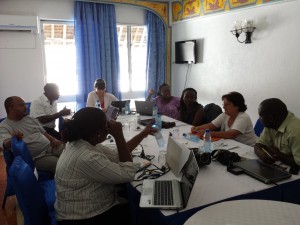How do we define advocacy? What do we advocate for and who are the beneficiaries of our work? What are our goals and objectives and how do we measure success? What tools do we use to reach our goals? And lastly, who are our strategic partners or target groups and how do we position ourselves in our external environment? These were some of the questions we asked ourselves when we came together for our international advocacy strategy meeting in Mombasa / Kenya from March 10th to 14th.
Representatives from DSW’s Executive and Management teams, international project coordinators as well national team coordinators for advocacy from our country offices in Ethiopia, Kenya, Tanzania, Uganda and the liaison offices in Berlin and Brussels traveled to Mombasa to agree on a global advocacy strategy guiding our work over the next couple of years. This strategy will be aligned to our overall DSW Strategic Plan 2011-2016 and will describe how the advocacy department will contribute to the implementation of our global organizational goals. The other rationale for developing a new advocacy strategy was that some organizational changes took place at DSW at a time of increasingly changing global dynamics for sexual and reproductive health and rights such as the development of a new global development framework beyond 2015, the launch of the FP2020 initiative or the ICPD beyond 2014 debate which we needed to adapt to. In addition, we realized that our country teams carry out advocacy in very different ways and at different levels, depending on their political, social and economic environment and the political priorities of the stakeholders they work with. A comprehensive advocacy strategy was therefore needed to provide for a coherent, organization-wide approach to advocacy in order to speak with one voice globally.
In addition to discussing the new strategy the meeting provided a great opportunity to address the challenges that a growing international organization like DSW with offices on different continents is facing in its daily work. That includes improving our internal knowledge management, enhancing the communication and mutual understanding between offices and better coordinating our messages and positions for advocacy. We also identified upcoming opportunities for external funding in order to sustain our successful work.
As these kind of face-to-face meetings are very rare the workshop also provided a great opportunity to learn from each other’s work and to find ways for collaboration and joint advocacy activities at international level. In addition to the intense meetings we were also able to spend some time together as a team in the beautiful old town of Mombasa.
We also visited some of the DSW projects in the Kenyan coastal area, such as a Youth Empowerment Center, a primary school collaborating with our Young Adolescents Project and two women’s group which are parts of our WOGE project. My colleague Jacinta has written a blog article on these meetings which you can find on DSW’s blog, too.
Generally, it was very inspiring to see that DSW has really made an impact over the last couple of years by advocating for policy and budget changes for health at different levels and by empowering young people and communities in a number of African countries. Having several national advocacy teams working from district level up to the UN helps up to be part of political decision-making both in Europe, Africa and internationally; and the close collaboration with our youth programmes makes our work truly evidence-based.



